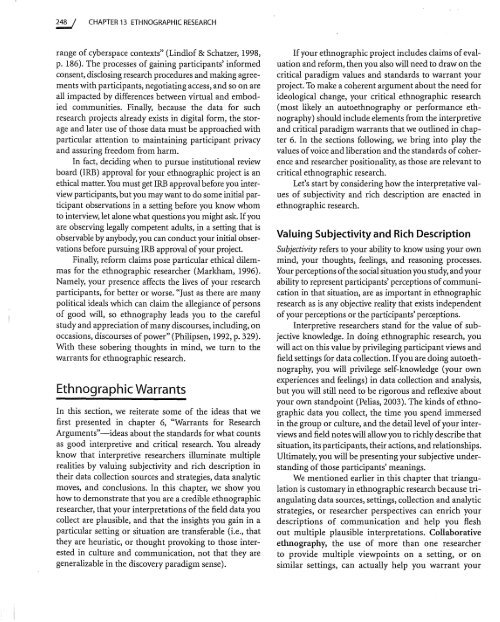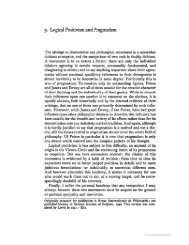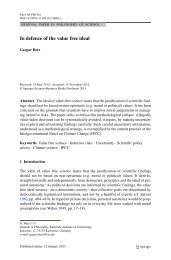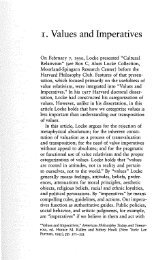Ethnographic Research - Matthew J. Brown
Ethnographic Research - Matthew J. Brown
Ethnographic Research - Matthew J. Brown
- No tags were found...
Create successful ePaper yourself
Turn your PDF publications into a flip-book with our unique Google optimized e-Paper software.
248! CHAPTER 13 ETHNOGRAPHIC RESEARCHrange of cyberspace contexts" (Lindlof & Schatzer, 1998,p. 186). The processes of gaining participants' informedconsent, disclosing research procedures and making agreementswith participants, negotiating access, and so on areall impacted by differences between virtual and embodiedcommunities. Finally, because the data for suchresearch projects already exists in digital form, the storageand later use of those data must be approached withparticular attention to maintaining participant privacyand assuring freedom from harm.In fact, deciding when to pursue institutional reviewboard (IRB) approval for your ethnographic project is anethical matter. You must get IRB approval before you interviewparticipants, but you may want to do some initial participantobservations in a setting before you know whomto interview, let alone what questions you might ask. If youare observing legally competent adults, in a setting that isobservable by anybody, you can conduct your initial observationsbefore pursuing IRB approval of your project.Finally, reform claims pose particular ethical dilemmasfor the ethnographic researcher (Markham, 1996).Namely, your presence affects the lives of your researchparticipants, for better or worse. "Just as there are manypolitical ideals which can claim the allegiance of personsof good will, so ethnography leads you to the carefulstudy and appreciation of many discourses, including, onoccasions, discourses of power" (Philipsen, 1992, p. 329).With these sobering thoughts in mind, we turn to thewarrants for ethnographic research.<strong>Ethnographic</strong> WarrantsIn this section, we reiterate some of the ideas that wefirst presented in chapter 6, "Warrants for <strong>Research</strong>Arguments"-ideas about the standards for what countsas good interpretive and critical research. You alreadyknow that interpretive researchers illuminate multiplerealities by valuing subjectivity and rich description intheir data collection sources and strategies, data analyticmoves, and conclusions. In this chapter, we show youhow to demonstrate that you are a credible ethnographicresearcher, that your interpretations of the field data youcollect are plausible, and that the insights you gain in aparticular setting or situation are transferable (i.e., thatthey are heuristic, or thought provoking to those interestedin culture and communication, not that they aregeneralizable in the discovery paradigm sense).If your ethnographic project includes claims of evaluationand reform, then you also will need to draw on thecritical paradigm values and standards to warrant yourproject. To make a coherent argument about the need forideological change, your critical ethnographic research(most likely an auto ethnography or performance ethnography)should include elements from the interpretiveand critical paradigm warrants that we outlined in chapter6. In the sections following, we bring into play thevalues of voice and liberation and the standards of coherenceand researcher positionality, as those are relevant tocritical ethnographic research.Let's start by considering how the interpretative valuesof subjectivity and rich description are enacted inethnographic research.Valuing Subjectivity and Rich DescriptionSubjectivity refers to your ability to know using your ownmind, your thoughts, feelings, and reasoning processes.Your perceptions of the social situation you study, and yourability to represent participants' perceptions of communicationin that situation, are as important in ethnographicresearch as is any objective reality that exists independentof your perceptions or the participants' perceptions.Interpretive researchers stand for the value of subjectiveknowledge. In doing ethnographic research, youwill act on this value by privileging participant views andfield settings for data collection. If you are doing autoethnography,you will privilege self-knowledge (your ownexperiences and feelings) in data collection and analysis,but you will still need to be rigorous and reflexive aboutyour own standpoint (Pelias, 2003). The kinds of ethnographicdata you collect, the time you spend immersedin the group or culture, and the detail level of your interviewsand field notes will allow you to richly describe thatsituation, its participants, their actions, and relationships.Ultimately, you will be presenting your subjective understandingof those participants' meanings.We mentioned earlier in this chapter that triangulationis customary in ethnographic research because triangulatingdata sources, settings, collection and analyticstrategies, or researcher perspectives can enrich yourdescriptions of communication and help you fleshout multiple plausible interpretations. Collaborativeethnography, the use of more than one researcherto provide multiple viewpoints on a setting, or onsimilar settings, can actually help you warrant your






